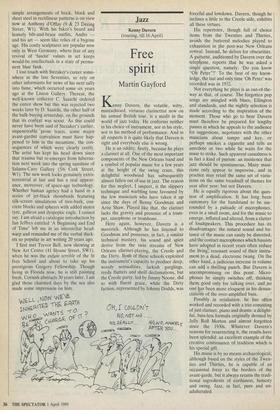Jazz
Kenny Davern (touring, till 16 April)
Free spirit
Martin Gayford
Kenny Davern, the volatile, witty, mustachioed, virtuoso clarinettist now on his annual British tour, is a misfit in the world of jazz today. He conforms neither in his choice of instrument, nor in his style, nor in his method of performance. And in all respects it is quite likely that Davern is right and everybody else is wrong.
He is an oddity, firstly, because he plays a clarinet at all. One of the most important components of the New Orleans band and a symbol of popular music for a few years at the height of the swing craze, this delightful woodwind has subsequently almost fallen out of use in jazz. The reason for this neglect, I suspect, is the slippery technique and warbling tone favoured by the few musicians who have taken it up since the days of Benny Goodman and Artie Shaw. Played like that, the clarinet lacks the gravity and presence of a trum- pet, saxophone or trombone.
Here again, however, Davern is a maverick. Although he has listened to Goodman and possesses, in fact, a similar technical mastery, his sound and spirit derive from the twin streams of New Orleans clarinet-playing, the Creole and the Dirty. Both of these schools'exploited the instrument's capacity to produce deep, woody sensualities, larkish gurglings, reedy flutters and shrill declamations,, but the Creole party, led by Jimmy Noone, did so with fluent grace, while the Dirty faction, represented by Johnny Dodds, was
forceful and lowdown. Davern, though he inclines a little to the Creole side, exhibits all these virtues.
His repertoire, though full of choice items from the Twenties and Thirties, avoids the battered melodies played to exhaustion in the post-war New Orleans revival. Instead, he delves for obscurities. A guitarist, auditioned by Davern over the telepijone, reports that he was asked a single question, namely: 'Do you know "Oh Peter"?' To the best of my know- ledge, the last and only time 'Oh Peter' was recorded was in 1932.
Not everything he plays is as out-of-the- way as that, of course. The forgotten pop songs are mingled with blues, Ellington and standards, and the nightly selection is made according to the inspiration of the moment. Those whO go to hear Davern must therefore be prepared for lengthy pauses in which he appeals to the audience for suggestions, negotiates with the other musicians about tempo and key, or perhaps smokes a cigarette and tells an anecdote or two while he waits for the muse to strike. Such apparent casualness is in fact a kind of purism: an insistence that jazz should be spontaneous. Many musi- cians only appear to improvise, and in practice may retail the same set of varia- tions on the same treadmill of themes for year after year; but not Davern.
He is equally rigorous about the ques- tion of amplification. It has long been customary for the bandstand to be sur- rounded by a palisade of microphones, even in a small room, and for the music to emerge, inflated and altered, from a clutter of loudspeakers. This procedure has its disadvantages: the •natural sound and ba- lance of the music can easily be distorted, and the'contact microphones which bassists have adopted in recent years often reduce the living, resonant sound of their instru- ment to a dead, electronic twang. On the other hand, a judicious increase in volume can add a thrilling punch. But Davern is uncompromising on this point. Micro- phones he simply switches off, thinking them• good only for talking over, and ,no and rias been more eloquent in his denun- ciation of the over-amplified bas.
Possibly in retaliation, he has often worked and recorded with a trio consisting of just clarinet, piano and drums: a delight- ful, bass-less formula originally devised by Jelly Roll Morton and almost forgotten since the 1930s. Whatever Davern's reasons for resurrecting it, the results have been splendid: an excellent example of the creative continuance of tradition which is his special gift.
His music is by no means archaeological; although based on the styles of the Twen- ties and Thirties, he is capable of an occasional foray to the borders of the avant-garde, but it always retains the tradi- tional ingredients of earthiness, honesty and swing. Jazz, in fact, pure and un- adulterated.


















































 Previous page
Previous page